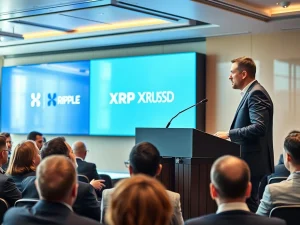Revolutionize Your **Crypto Exchange Solutions**: White-Label Platforms Slash Operational Costs by 70% in 2025

Are you considering launching your own cryptocurrency exchange but daunted by the immense costs and technical hurdles? The landscape for **Digital Asset Trading** is rapidly evolving, and 2025 marks a pivotal year for businesses looking to enter this dynamic space. Thanks to innovative **White-Label Crypto Exchanges**, the dream of owning a bespoke trading platform is no longer reserved for tech giants. These solutions are not just simplifying the process; they’re dramatically cutting expenses, promising up to a 70% reduction in operational costs, effectively dismantling traditional market barriers.
Unlocking Efficiency with White-Label Crypto Exchanges
In 2025, the market for **White-Label Crypto Exchanges** has truly come into its own, becoming a cornerstone for rapid expansion within the digital economy. Platforms like Binance Cloud, HollaEx, and AlphaPoint are leading this charge, offering customizable, enterprise-ready solutions that empower businesses to launch their own exchanges with unprecedented speed. Imagine bypassing the prohibitive costs and intricate technical complexities traditionally associated with in-house development. This is the core promise of white-label services.
- Pre-built Infrastructure: Gain immediate access to robust, battle-tested systems.
- Liquidity Pools: Leverage existing liquidity, a critical factor for competitive trading.
- Advanced Compliance: Benefit from integrated tools for AML and KYC adherence.
- Multi-lingual Support: Reach a global audience from day one.
For instance, Binance Cloud’s seamless integration with Binance’s core trading systems allows partners to deploy exchanges with instant access to deep liquidity, offering a significant competitive edge. Similarly, AlphaPoint has carved a niche among institutional clients by prioritizing sophisticated compliance frameworks and AI-driven analytics, ensuring regulatory demands are met head-on.
How White-Label Solutions Drastically **Reduce Operational Costs**
The financial implications of adopting white-label solutions are nothing short of revolutionary. Industry analyses reveal that these platforms can **reduce operational costs** by as much as 70% compared to building an exchange from the ground up. This staggering efficiency gain isn’t just a number; it’s a game-changer for businesses.
Consider the traditional path: you’d need to invest heavily in:
- Extensive software development and maintenance teams.
- High-end hardware infrastructure and security protocols.
- Ongoing regulatory compliance and legal counsel.
- Establishing liquidity and market-making partnerships from scratch.
White-label providers absorb these massive overheads, allowing banks, fintech firms, and even startups to redirect their focus and capital towards crucial areas like user acquisition and market expansion. This strategic shift has accelerated the adoption of cryptocurrency services across diverse sectors.
Lowering **Cryptocurrency Market Entry** Barriers
The primary appeal of white-label platforms lies in their ability to democratize access to the burgeoning crypto economy. By providing ready-made infrastructure, they significantly lower the barriers to **Cryptocurrency Market Entry**. This enables a broader range of participants, from established financial institutions to innovative startups, to offer crypto services without needing specialized blockchain development expertise.
Changpeng Zhao, CEO of Binance, aptly summarized the ecosystem benefits: “Binance Cloud enables partners to harness secure, battle-tested infrastructure and expand local crypto ecosystems.” This sentiment underscores a collaborative approach, fostering growth and innovation across the industry.
The competitive landscape in 2025 is also witnessing diversification, with non-custodial models gaining significant traction. Platforms like ChangeNOW, serving over 5 million users, exemplify this trend by prioritizing decentralized asset control, aligning with the broader industry preference for self-custody and user empowerment.
Navigating the Evolving Landscape of **Crypto Exchange Solutions**
While the benefits are clear, the market for **Crypto Exchange Solutions** is dynamic and presents its own set of challenges. Providers like ChainUP and HollaEx distinguish themselves through modular architectures that emphasize rapid deployment and advanced fraud detection capabilities. However, analysts note that the market remains somewhat fragmented, with varying levels of technological maturity among different providers.
Regulatory challenges continue to persist, especially as major jurisdictions like the U.S. and EU tighten their Anti-Money Laundering (AML) and Know Your Customer (KYC) requirements. White-label providers are proactively integrating automated compliance tools to meet these stringent demands, though gaps in cross-border operability still exist. Strategic collaborations, such as Deepcoin’s partnership with Upbit Singapore for cross-platform transfers, illustrate how these platforms are working to enhance interoperability and global reach.
The Future of **Digital Asset Trading** Infrastructure
The growth of the **Digital Asset Trading** sector is fundamentally underpinned by continuous innovation in security and scalability. AlphaPoint’s consistent adaptation to evolving compliance standards and ChainUP’s relentless focus on data encryption highlight the industry’s commitment to meeting institutional-grade security needs. However, long-term success for white-label providers hinges on two critical factors:
- Addressing Fragmentation: Moving towards more standardized and interoperable solutions.
- Maintaining Compliance: Adapting swiftly to a rapidly changing global regulatory environment.
As more businesses seek scalable and efficient entry points into the burgeoning crypto space, providers like Binance Cloud and ChangeNOW are solidifying their positions as indispensable infrastructure players. They are not just offering tools; they are building the very foundations upon which the next generation of digital finance will thrive.
The era of costly, time-consuming exchange development is giving way to a new paradigm of rapid deployment and cost efficiency. White-label solutions are proving to be the key, empowering businesses worldwide to tap into the immense potential of the cryptocurrency market with unprecedented ease and affordability. The future of digital asset trading is here, and it’s more accessible than ever before.
Frequently Asked Questions (FAQs)
Q1: What is a white-label crypto exchange?
A white-label crypto exchange is a ready-to-use, customizable software solution that allows businesses to launch their own cryptocurrency trading platform under their brand name without developing the entire infrastructure from scratch. Providers offer the core technology, liquidity, and often compliance tools.
Q2: How much can white-label solutions reduce operational costs?
According to industry analyses, white-label crypto exchange solutions can reduce operational costs by up to 70% compared to building and maintaining a proprietary exchange. This significant saving comes from leveraging pre-built infrastructure, shared liquidity, and outsourced technical development.
Q3: What are the main benefits of using a white-label crypto exchange?
Key benefits include rapid time-to-market, significant cost reduction, immediate access to liquidity, robust security features, integrated compliance tools (AML/KYC), and the ability to focus resources on marketing and user acquisition rather than complex technical development.
Q4: Who are some leading white-label crypto exchange providers in 2025?
Leading providers in 2025 include Binance Cloud, HollaEx, AlphaPoint, ChainUP, and ChangeNOW. Each offers distinct features, with some focusing on institutional clients and compliance, while others emphasize non-custodial models or rapid deployment.
Q5: Are there any challenges associated with white-label crypto exchanges?
Yes, challenges include market fragmentation among providers, varying levels of technological maturity, and ongoing regulatory complexities, particularly concerning cross-border operability and adapting to evolving AML/KYC requirements. Businesses must carefully choose a provider that aligns with their specific needs and compliance obligations.









